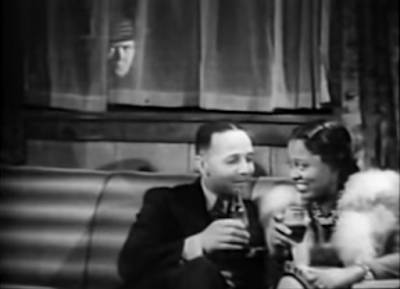TO LET: Unique property at 1313 Wellman Road. Includes hidden laboratory, lurking monster. Perfect starter home for defenceless couple... It's a fixer-upper alright but there's a solid structure beneath 1940's SON OF INGAGI...
Most modern audiences approaching Son of Ingagi will know it's widely considered to be the first Black horror movie, having been penned by African-American 'race film'-maker Spencer Williams and performed by an all-Black cast. Cinema historian Tananarive Due considers its genre secondary to the film's purpose, arguing that it was "really meant to confront so many negative stereotypes about black people in cinema but using horror, which was a very popular genre, to present us just being ourselves". While this is true, the film still notches up what feel like a couple of horror firsts, making it possibly even more of a landmark than its reputation suggests.
Newlyweds Eleanor and Robert Lindsay (Daisy Bufford and Alfred Grant) have inherited a big old house that once belonged to Dr Jackson, a woman thought of as the local witch. The Lindsays always liked her but, thanks to her mysterious death, they now find themselves facing all kinds of strange occurrences in her old home. It turns out the doctor had a skeleton in her closet... or, more accurately, a 'wild man' from Africa in her basement lab. And just before he killed her, he'd imbibed a secret formula that not only apparently drove him into a murderous rage but also imbued him with superhuman strength! Let's hope comedy cop Detective Nelson (played by writer Williams) can sort things out and prevent more deaths - or at least keep track of his disappearing sandwiches... Priorities, man!
1974 was the big year for 'hider in the house' horror, finding a voyeuristic killer occupying a secret room in the TV movie Bad Ronald and calls coming from inside the house! in the early slasher Black Christmas. It continues to impress me, then, that Son of Ingagi was playing with this notion so effectively four decades earlier, and I can't think of an earlier example of the trope.
Where later films have played up the killer's ingenuity and twistedness, Ingagi keeps it fairly simple: its bogeyman, named N'Gina, awakens whenever a gong is struck and leaves his lair to prowl the house. With race films simultaneously ahead of the curve in terms of representation, but possibly playing catch-up in other respects, he comes across as something like the child of Universal's Frankenstein monster from nearly ten years prior: brutal and fierce, but misunderstood and ultimately somewhat tragic.
Similar discrepancies add further interesting wrinkles, beginning with the two protagonists, whose freedom from the stereotypical constraints of the period makes them a joy to watch - but who (as Due suggested above) don't enormously act like they're in a horror film and aren't, for example, terribly troubled by the piles of bodies turning up in their home. But even this feels miles ahead of the subservient cowards Black actors had to play in other Old Dark House movies.
Diversions more typical of the time come in the shape of a couple of seemingly off-the-cuff musical numbers (courtesy of the excellent Four Toppers) and, less enjoyably, an extended skit towards the end involving the aforementioned sandwiches. But, just when you're thinking the film has lost its way at a crucial point, a genuinely gruesome shooting ushers in a climax full of fairly strong stuff. The amount of blood spilled certainly raised an eyebrow from me, anyway, and is nicely foreshadowed by a stylish moment earlier on, in which the camera lingers on a splatter of spilled ink in the aftermath of a murder. (In fact, this entire sequence, featuring eyeballs in extreme close-up and that oozing pool of black, prefigures the famous shower scene of Psycho.)
Flashes of such originality, then, coupled with the uniquely progressive feel of a race picture, make Son of Ingagi a very rewarding watch. Don't worry if you've never seen nor heard of 1930's Ingagi - this has nothing to do with that apparently hard-to-find film - and instead prepare for one of the most offbeat entries in an already offbeat genre.
RATING: 🕸🕸🕸


No comments:
Post a Comment